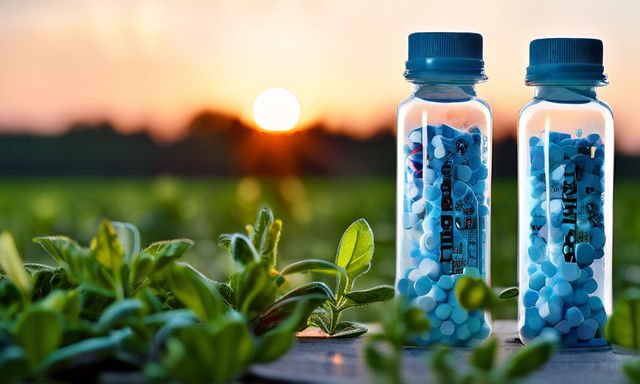What's behind transgenic products?
What's behind transgenic products?

What is behind transgenic foods or products, because like everything in this life it has its pros and cons, and it seems as stupid to me to be completely against as to be completely in favor, both positions, both extremes, I think are not realistic, for That's what I'm going to explain what a food product is, how it's made and then everything around it, the positive and the negative.
A transgenic food is purely and simply a food that has been genetically modified, that is, a fragment of DNA has been introduced through genetic engineering techniques to the cells that make up that food, to the base cells, we are talking above all about plants, although it is also done with other foods, so that it gives us differential characteristics.
Some specific characteristics, for example, resistance to pest diseases, for example, of the grasses of certain crops, avoid viruses, avoid bacteria, etc., this is bad or good, I always give the same example a transgenic food of the entire life, wine is wine, wine is a transgenic food, what happens is that the genetic modification that wine has because alcoholic fermentation alters the genes of the grape, it is a genetic alteration that we have accepted and that has no side effects except the alcohol poisoning.
Other examples of transgenic products, for example, insulin, the current insulin that we consume today, people who are diabetic, since logically it is a 100% transgenic product, not many years ago at the beginning of the last century when insulin was discovered. In order to treat people who were diabetic, what was done was to inject them with macerates of cellular remains from animal pancreas. The first child who was treated with injections for diabetes was a child who was given a macerate of pancreas cells from animals. Dog, imagine the reactions.

When we talk about transgenic foods, I think you all have in mind these super multinationals, especially American ones, Monsantos and others, that produce corn seeds, soybeans, there are many products, the truth is that they are genetically modified, they have their pros and cons. against; The first great advantage, as any manufacturer of transgenic seeds tells you, is that the vegetables obtained, whether soybeans or corn, are more resistant to pests and diseases than those of plants, which a priori improves yield. of crops in the medium long term is much higher.
There are also transgenic products that in the genetic alteration consist of making them have genes that improve their nutritional qualities, that is, that they have more vitamins, that they have more minerals, etc., basically that with less corn or with less leaf you have the most amount of active ingredients, vitamins or whatever, that these vegetables have, no matter what, is also interesting.
One thing that any manufacturer of transgenic products tells you is that of course, productivity increases because we are experiencing global population growth, it is brutal and we must feed all the people and it is true that agricultural productivity improves, if only that were the case. , it is true, then we will see that it is not as true as they say and if this were only the case it would also be positive that they help us reduce the consumption of pesticides, insecticides and others with which these multinational companies are so beneficial that they help preserve the environment , they comply with the requirements of the regulations, so far everything is perfect. all pretty.

Everything positive also has its negative side, the point is that the side effects of all these genetic modifications that are made in the diet, both of humans and animals, have not been studied 100%, it has not been proven that there are many side effects, Generally, especially at the level of food allergies and intolerances that we are unaware of, in the case of wine, as we have been using it for thousands of years, we know that it is a safe transgenic food, but the new varieties of transgenic corn, papayas, etc. virus-resistant example, we do not know and this in the short term is all very nice, but one has to consider what is going to happen in the medium and long term and the food safety studies that are carried out to assess or allow the commercialization of a transgenic product Well, they lack very long-term studies and that today, whether we want it or not, does not exist.
Another negative impact and this is undeniable is that the more you use transgenic plants, transgenic seeds, the greater the environmental impact, in terms of biodiversity, that is, we are interested in having the greatest possible diversity of plants that naturally evolve the plants themselves. they become resistant to certain problems because this is nature, the evolution not only of humans but of any living being on the planet is positive, when we try to manipulate this natural evolution, problems occur in which species disappear that perhaps in the future could be beneficial and interesting. .
Another great risk that is not usually assessed and this is very proven, is the appearance of resistance, that is, if you have a plant, for example, a corn resistant to the fungus, the corn fungus, the fungus is not stupid, but The fungus will adapt little by little, and in that adaptation new variants are born, for example of fungi, viruses or bacteria that affect plants that are much more resistant and this has also been seen, this is undeniable, which The thing is that the manufacturers of these products never tell you.

It has been seen that in the long term if you generate resistance from both bacteria and viruses, such as fungi, what you will need is a greater amount of pesticides to treat problems that in the past were treated with fewer insecticides, the uses massive amounts of these transgenic products tend, not in all cases obviously, but there is a tendency that you will need more insecticide and more pesticide to treat your crops.
Coincidentally, the same manufacturers of foods, seeds, and transgenic products sell you the insecticide, it is like that saying, “the bank always wins”, we must demand that the changes we make in the genes of both plants and animals are much more precise. , that we only take and modify one thing that we also know what side effects it has and this today with Crispr genetic editing techniques is achievable.
The general population talking about transgenics is something very negative and very possibly today it is, in the medium, long term this may not be the case, but everything has to be proven, we have to see studies and the truth.
It's great that you're delving into the nuances of transgenic foods. It's essential to strike a balance between understanding their benefits and acknowledging potential risks. Looking forward to learning more about the positive and negative aspects in your upcoming posts.
Thank you, we have to be careful, since diet is one of the main causes of our health problems.
stay free.
Per me i transgenici sono come una sorta di "selezione naturale", beh, facciamo la selezione, scegliamo i geni migliori per trarne vantaggio.
Ne approfittano anche le aziende, sempre a loro vantaggio.
Saluti.
Of course, and behind those interests are hidden bad intentions.